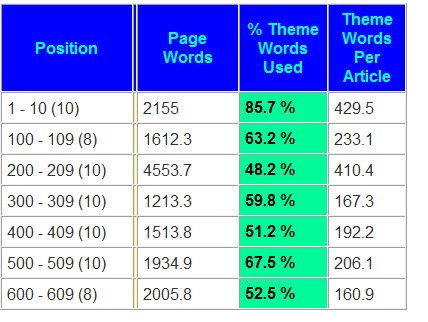Niche Vocabulary – Why Poor Content Can’t Hide in Google

Google can spot bad content a mile off and consign it to the supplemental index, but there is a simple solution to making sure big G sit up and take note – use your niche vocabulary.
When an expert in any field writes an article, there is a certain vocabulary associated with the topic of the article. Someone who knows the topic very well will use that vocabulary naturally within the article and in fact needs to use it if the article is to be a quality piece on the topic.
Someone who really doesn’t know the topic will struggle to perhaps not only find, but also use the niche vocabulary correctly … and this content will stick out … in a bad way!
Could you write without this vocabulary?
Let’s assume you want an article written on Epilepsy. You tell your ghost writer that you want a 600 word article on Epilepsy but, they MUST NOT use any of the following phrases:
symptoms of epilepsy, ketogenic diet, epilepsy treatment, part of the brain, areas of the brain, location in the brain, portion of the brain, types of epilepsy, living with epilepsy, types of seizures, death in epilepsy, aid for seizures, complex partial seizures, generalized tonic-clonic seizures, temporal lobe, epileptic seizures, epilepsy therapy, epilepsy surgery, epilepsy syndromes, seizure type, vagus nerve, generalized seizures, absence epilepsy
.. or any of the following words:
epilepsy, seizure, treatment, seizures, unit, age, log, surgery, test, children, brain, medical, health, control, time, diet, doctor, side, help, part, research, diagnosis, information, cause, life, medications, support, anti, ketogenic, drugs, take, guide, special, term, develop, work, home, plan, living, symptoms, types, aid, epileptic
How good do you think your article would be?
Not great I’d bet.
The reason is simply that in order to write a quality piece on Epilepsy, you MUST include some of these words & phrases – they are the vocabulary of the topic!
To highlight the point, those 43 words in the list above appear on at least 7 of the top 10 pages that rank in Google for the term Epilepsy.
These words and phrases are the vocabulary of this niche.
Now epilepsy is a huge topic, so let’s specialize a little to see how the niche vocabulary changes.
Let’s repeat this experiment but use the term “epilepsy treatment” instead.
Here are the kinds of phrases found in articles that are ranking in the top 10 of Google for “epilepsy treatment”. Again, can you imagine writing a quality article without including at least some of these phrases?:
surgical options for epilepsy, used to treat epilepsy, effects of epilepsy drugs, vagus nerve stimulation, options for epilepsy, diagnosis of epilepsy, seizure hot spots, temporal lobe epilepsy, epilepsy treatment, ketogenic diet, vagus nerve, side effects, epilepsy surgery, patient stories, nerve stimulation, treatment options, treat epilepsy, seizure disorder, children’s hospital, temporal lobe, control seizures, prevent seizures, epilepsy drugs, drug therapy, surgical options, antiseizure medicine, epilepsy drug, seizure medicines, pediatric eeg, treat patients, pediatric neurologists, new therapies, antiepileptic medicines, surgical treatments
In the initial search on epilepsy the phrases were more general in nature. These ones are a lot more specific to actually treating the disease. See how there is a subtle change in the vocabulary that is used?
The following 51 words appear on at least 7 of the top 10 pages that rank for the term “epilepsy treatment”:
epilepsy, seizure, treat, treatment, seizures, unit, age, log, surgery, test, children, brain, medical, health, control, medication, time, diet, doctor, side, drug, help, part, research, diagnosis, information, effects, cause, life, medications, nerve, support, anti, ketogenic, drugs, vagus, take, stimulation, guide, reserved, special, term, develop, work, home, tests, fact, plan, related, living, map
OK, so what’s my point?
Well my point becomes a little more obvious if we look further down the search results. Google tells us that there are 13,600,000 pages in their index that match this query.

However, if we go through Google (I have switched Google over to show me 100 pages of SERPs at a time), and scroll to the very last page, Google tells us something very interesting:

Do you see how Google says that only 801 pages are included in the main index?
Google is filtering out poor content as well as content that it just doesn’t think adds anything extra to the information & value available on this topic. In effect, Google has picked the best 801 pages that fully represent this topic – any page outside this set of 801 won’t be ranking for term “epilepsy treatment”!
Do you know what those 801 pages have in common?
They use the “epilepsy treatment” niche vocabulary.
As an experiment I picked pages ranked at various levels in the SERPs, and looked at how many of the 51 “theme words” I listed above are included in the “average page” ranked at that level. Here are my results:

This table should be fairly straight forward to read but essentially show the average values for a group of pages ranked at different levels in the SERPs.
The columns are as follows:
Position – where in the SERPs the pages were collected to perform the analysis. You will note a number in brackets after the SERP position. This reflects the number of pages analyzed. In most cases it is 10, but in a couple of cases, some pages were not available when I visited, so they were excluded and you see that 8 pages were used in the 100-109 positions, and 8 in the 600-609 positions.
Page Words – the average total number of words on the page.
% Theme Words Used – This column shows the average percentage of the 51 theme words identified earlier that are used on the pages.
Theme Words Per Article – This shows how many of the “Page Words” were actually “theme words” i.e. on of my 51 words chosen as niche vocabulary.
When I first show this type of data to people, they are often surprised to see that even those pages ranked towards the ends of the SERPs have such high levels of “niche vocabulary” (remember Google only includes 801 pages in the main SERPs for this phrase so we are checking pages that are way down the pecking order).
I am not really sure why this should surprise anyone, since Google are trying to show only the best articles for this (and every other) search term, and any quality piece will NEED to use the niche’s vocabulary.
A word about the data I have used
The theme words and phrases that make up the niche vocabulary in these Epilepsy experiments were taken from the top 10 pages in Google.
However, since ALL of the pages in the main SERPs use a similar niche vocabulary for this search phrase, I could actually collect my theme phrases from any of the 801 pages that Google deems relevant for “epilepsy treatment”. I have actually done this experiment in another article if you are interested in seeing the results – you can read it in my blog post under the section “A Flaw in My Methods?”
So what does this mean for Webmasters?
There are a few lessons to be learnt from this type of data:
- There is a “smallish” group of pages that Google sees as relevant for every search term. This number is actually a lot less than most people think. If you are not in that group, you have no chance of ranking in the SERPs for that term. That doesn’t mean your page is permanently in the supplemental index, it just means that it is in the supplemental index for that particular search term because Google does not think it is good enough, or adds anything extra to those pages already in the group.
- There is a niche vocabulary for every search term. Pages that Google include in the SERPs usually use that vocabulary and if you want your page to stand any chance of ranking for a search term, you should be using the correct vocabulary too.
Final Summary
If you are an expert in the field that you are writing about, then you do not need to worry about niche vocabulary. You know what it is already and will use it naturally as you write your content. If, however, you are hiring ghostwriters that are not experts in the field, you better make sure they are doing their research properly or your page could end up hidden in an index that rarely sees the light.
 SEO is Evolving: Trend You Need to Know About [Infographic]
SEO is Evolving: Trend You Need to Know About [Infographic] 5 Writer’s Blocks, Which Prevent You From Writing The Next Blog Post
5 Writer’s Blocks, Which Prevent You From Writing The Next Blog Post 14 Tips To Help You In Marketing Your WordPress Site
14 Tips To Help You In Marketing Your WordPress Site Does schema.org Markup Really Improve Google Search Ranking Position?
Does schema.org Markup Really Improve Google Search Ranking Position?
{ 29 Responses }